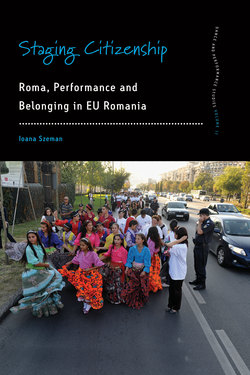Staging Citizenship

Реклама. ООО «ЛитРес», ИНН: 7719571260.
Оглавление
Ioana Szeman. Staging Citizenship
Staging Citizenship. Roma, Performance and Belonging in EU Romania
Contents
Illustrations
Acknowledgments
Introduction
Performance and the Citizenship Gap
The Citizenship Gap in Pod: Basic Citizenship Rights and Cultural Citizenship
‘Roma Culture’ Clashes: The State, the EU and Roma NGOs
Roma in Romanian and European History: Stereotypes and Erasures
Persecution and Erasures in the Twentieth Century
Methodology
Chapter Outline. Part I: Poor Roma, Roma Activists and the Romanian State
Part II: Roma Performance and the Citizenship Gap: From Exoticism to Creative Resistance
Notes
Chapter 1
‘We Will Build a Beautiful Future Together’ NGO Historiography, Roma Culture and Monoethnic Nationalism
Outside the Archive/the Outside Archive: Consuming Roma Culture in the Marketplace
Minor Histories: From Slavery to the Holocaust
Minor Histories and Social Etymologies: ‘Ţigani’ and Slaves
The Roma and Romanian Nationalism
Conclusion
Notes
Chapter 2
Living in the Citizenship Gap. Roma and the Permanent State of Emergency in Pod
Life as a State of Emergency in Pod
Armando
Recycling: From Survival to Entrepreneurship
Dumitru and Irina
Mirela
Building a Life in Pod. Adam
Miki
Vanesa
Black versus White: Gendered Racialization and the Citizenship Gap
Vanesa, Giani and Mona
‘You Are where You Are Coming from’: Racialization by Contagion
Alex and Mira
Conclusion
Notes
Chapter 3
Too Poor to Have Culture? The Politics of Authenticity in Roma NGO Training
Setting the Scene
The PHARE Programmes: Improving the Situation of which Roma?
Training the Trainers: Performing Neoliberal Civility
Closing the Gap: Authentic Artisans and Selfish Entrepreneurs
Conclusion
Notes
Chapter 4
Performing Bollywood. Young Roma Dance Cultural Citizenship
The Citizenship Gap in the Classroom
From All-Roma Schools to Special Schools: The Persistence of Discrimination
Blaming the Parents
Quotas for Roma Students: Resistance and Lack of Information
Educating and Informing via Roma-led Television Programmes
Together: Dancing across Cultures, in Mainstream and Special Schools
From Csingeralas to Bollywood: Rejecting Authenticity and Claiming Cultural Citizenship
Bollywood Dance and Roma Counterpublics
Notes
Chapter 5
Consuming Exoticism/Reimagining Citizenship. Romanian Nationalism and Roma Counterpublics on Romanian Television
Consuming ‘Gypsy Chic’ and Scapegoating Roma in Gypsy Soaps
Roma Caravan: Roma-led Romanian Television
Between Ţigani and ‘Palaces with Turrets’: Can Roma Speak on Mainstream Romanian Television?
Roma Counterpublics: Watching Gypsy Soaps in Pod and Beyond
Young Roma Counterpublics and Gypsy Soaps
Conclusion
Notes
Chapter 6
The Ambivalence of Success. Roma Musicians and the Citizenship Gap in Romania
‘Gypsy Music’, Nationalisms and the ESC
Manele, Roma Musicians and Racialized Musical Hierarchies in Romania
From ‘Gypsy Frenzy’ to Manele: What they Talk about when they Talk about Gypsies
‘Ioniţă and Viorica Trump the Ceauşescus’: Roma Musicians, Dystopia and Counterpublics
Conclusion
Notes
Conclusion
Unlearning the Forgetting
Note
Bibliography
Index
Отрывок из книги
DANCE AND PERFORMANCE STUDIES
General Editors:
.....
I am a gadgi (non-Roma) and Romanian citizen of mixed Romanian-Hungarian descent, with a Ph.D. gained in the United States and currently working in the United Kingdom. Some of my non-Roma Romanian friends and acquaintances rolled their eyes upon hearing about my research topic, and worried that I would reiterate or add to many Westerners’ mistaking of Romanians for Roma; some asked me ‘please don’t make us all look like Ţigani.’ My Western location at the time of my fieldwork in Romania, being the United States and, after 2005, London, bestowed upon me a certain cachet among some of my informants: one of the Romnja in Pod decided I was Spanish, a nation to which she felt connected; one Romni from the village of Clejani called me a ‘foreign gadgi’, as opposed to a local, Romanian gadgi. At times the perception of my identity shifted – for example, when a lawyer asked me whether I was a Romni friend’s daughter, even though we were both in our thirties. This instance, when I was taken for a Romni by a non-Roma, was a shocking (for me but not, as it turned out, for my Romni friend) reminder of the widespread gendered stereotypes about Romnja as young, over-fertile mothers with dozens of children. Several times, when I accompanied friends and witnessed similar situations, the casualness of such incidents and the everydayness of racism really struck me. My shock reflected my privileged position: for my Roma friends and acquaintances these incidents were not surprising. As I show in Chapter 2, there was no shortage of such incidents: encounters in hospitals, schools, shops and police stations, and often with state employees, demonstrated this everyday racism.
In many instances my ethnographic journey involved making the familiar strange and the strange familiar. Performance and theatre scholar Baz Kershaw discusses radical theatre, which has the power to change the ideological inclination and worldviews of audiences: ‘theatre which mounts a radical attack on the status quo may prove deceptive. The slow burning fuse of efficacy may be invisible’ (1992, 28). I see the slow burning fuse metaphor as an apt description of the change in subjectivity that I experienced when making the strange familiar and vice versa. The slow burning fuse was started for me most likely at a Christmas celebration in Pod, when I visited with non-Roma friends. In these moments, when I was allowed into people’s lives, the expected power balance was temporarily redressed; instead of only witnessing suffering and injustice, I spent enjoyable moments with Pod friends. These became turning points in the co-witnessing process of ethnography, when the initial impulse, of seeing Pod as a problem that needed a solution, receded to some extent. I started listening to people more carefully, to their music, their dances and their actions. My sense of outrage at their situation never disappeared, but it became equally important for me to document their other stories – in addition to stories about injustice and discrimination – from the way they saw Gypsy soaps to their perspectives on belonging in Romania.
.....